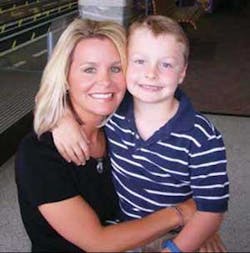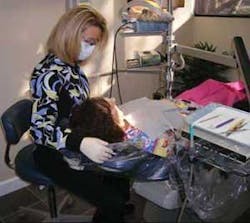The single approach
by Cathy Hester Seckman
In describing her life as a single parent, hygienist Kim McDaniel of Winston-Salem, N.C., says, “It is what it is.” She refuses to feel sorry for herself or complain about her situation. “You really have to just decide — is the glass half empty or half full? I'm strong. Honestly, there's no other choice when kids are involved. My son and I will move forward, and we'll make this life the best it can possibly be.”
Another hygienist, we'll call her Lory, agrees that the best thing a divorced parent can do is put on a happy face. “Crying changes nothing, but laughing makes the situation easier to handle. People have asked me how I can laugh about the circumstances of my second divorce, and I say that laughing is better than being depressed. Those are my only two choices. I'm the one in control of my future, and giving that control to another person is unacceptable. I'm fairly successful at keeping a balanced, humorous life.”
Dawn Kasper, a hygienist in Illinois, has a less positive view of divorce. “You need all the strength you can muster. I was very determined to get through my divorce without taking any medications, but looking back, I could have made it so much easier for myself. I lost 25 pounds during my divorce. I wasn't heavy to start with, but I lost my desire to eat due to the ongoing and never ending stress.”
According to the U.S. Census Bureau, there are more than 13 million single parents raising 21 million children in the United States. Kim, Lory, and Dawn fit the Bureau's profile of the average single parent in many respects: female, divorced or separated, over 40, employed full-time, does not live in poverty or receive public assistance, and has one child.
The reason they don't live in poverty, of course, is because they're hygienists. Kim says, “I'm very blessed to have chosen hygiene. My mother was a single mom, and she struggled. When I chose a career, I knew I wanted to be able to find a job easily, I wanted to be able to support my family if necessary, and I wanted to live in a manner I'm accustomed to. Now that I'm in this situation, I know I made the right career decision.”
Kim entered a hygiene program immediately after high school, and graduated in 1992 from a combined program at Gainesville College and Lanier Technical Institute in Atlanta. She was 20. “I know that's unusual. I was the youngest person in my class.”
Her first job experience in Georgia was perfect, she says, for someone so young. “It was a great place to start, a group practice with six dentists and six hygienists.” Kim and her husband later moved to Colorado, where she was able to get a hygiene license by reciprocity. When the couple moved back to their home state of North Carolina, though, it was not so simple. “I had to go through the whole licensing thing again, finding a board patient and taking the written exam. I worked for a solo dentist for a while, but when Tyler was born I decided to do fill-in work only.”
After her divorce in 2006, Kim needed a permanent job. “In my area the median family income is $47,000, and as hygienists we're slightly above that, even with a two-year degree. I was able to find a job with insurance, bonuses, paid vacations and holidays, paid CE, a uniform allowance, and a 401(k). I work four days a week from 7:30 to 4:30.”
In Dawn's experience, finances were an important hurdle to overcome during divorce. “There's a lot of adjusting to do. You're no longer in the same financial situation, and most of us find ourselves struggling to make ends meet. If you're facing a divorce you may have to consider selling the home you've come to love and moving elsewhere. Vacations may no longer be feasible, and buying things you need or love may be out of the question.”
Dawn's advice for those contemplating divorce is to be meticulous about finances. “Gather all the financial records of your married life. Gain control of your finances. Start your own checking account as soon as you can. Get credit in your own name. Make career choices and be sure you have a job with enough income to pay your bills, and one that includes medical and dental insurance.”
Child care is another big hurdle for a newly single parent. For Kim, everything fell into place. “Tyler goes to a private Christian school that has before- and after-school care. I drop him off on my way to work, and pick him up when I'm finished. If he's sick, my employer has an area in the office where he can stay. If he's too sick for that, I can reschedule all or part of my day and stay home with him.”
During the summer, Tyler attends Discovery Quest Camp at the school when he's not on vacation with his mother, father, or grandmother.
For Lory as well, child care was not a big problem, even though she had four children from her first marriage and adopted her second husband's five children. “After my first divorce my youngest was in home-based child care and his siblings were in school. During the summer or whenever he was off work, my ex-husband would care for the children while I worked. During my second marriage the children had a part-time nanny for after-school care. I can happily say they're all over 18 now.”
Dawn, who was married for 20 years, separated for three, and has been divorced for four, also had young children to manage as a single parent. “They were 14 and 10 when the separation occurred. I had full custody, but we never stuck by a strict schedule for visitations with their father. We live very close to each other, and it was easier for the kids to work that out themselves. When they were young I always tried to have family there for after-school care. I did a lot of juggling of my work schedule during their childhood.” Her daughter Amanda is now 22 and is in her first job as a technical writer and account executive for an Internet company. She is considering a master's degree program in genetics. Dawn's son Ari, 18, is a prelaw freshman at George Washington University in Washington, D.C.
Dawn, after 28 years in clinical practice, now works part-time in a general practice. She is a speaker, published author, and practice management consultant. “I'm in the process of starting my own company that concentrates on coaching offices to not only survive in these difficult economic times, but to flourish.”
Tyler is Kim's priority, so she doesn't date or have much time to herself, but she does compete in races and triathlons. “I train on Fridays and when Tyler is with his dad. Right now I'm getting ready for a half-marathon.”
Despite what seems like a perfect situation, Kim says divorce and the single-parent lifestyle are never easy. “My ex-husband is supportive, but he has a very demanding job. My family doesn't live close, so I depend on support from friends and church — with them, you can make it.”
Lory agrees that faith is important in a single parent's life. “Having a spiritual center is essential in keeping the sanity as a single parent. Although most of my children no longer practice the religion in which they were raised, every one of them says it was helpful and a huge support during their teenage years. And most say they will raise their children with a spiritual focus.”
Dawn credits her family with helping her cope as a single parent. “My family has been great in their support, especially my parents. I could not have done this without their care, concern, listening ears, and shoulders to cry on. Their love truly helped me and continues to help me. I never found much in support groups in my area, and sadly, my need for spiritual help wasn't fulfilled by my clergy. Quite honestly, one does a lot of questioning of their beliefs during such an overly stressful time. I read books on divorce and empowering myself as a woman. Those helped me a great deal. I'm also a very compassionate person, and that's helped me greatly in life. I believe my passions for my family, children, friends, and career have brought me to where I am today, and my hope is that they will continue to see me through to a better tomorrow.”
To parents facing divorce Dawn says, “Prepare yourself as much as possible ahead of time. Gather your emotional support team and put them in place as fast as you can. Interview many lawyers, as they are not the same in practice as they present themselves in the initial interview. Make sure you know who your real friends are. Don't be surprised by the actions of your spouse. His/her personality will change greatly during the divorce process, and even if you considered that person to be very loving and caring before, he/she can and often will become bitter, mean, hateful, and spiteful. You will not recognize the person you once loved.
“But try, if you can, not to speak hatefully about the other parent to your children. Remember this is also their parent, and they do not see the person in the same light as you do. It confuses, angers, and hurts them terribly if you speak hatefully. Also, if you can, see a counselor or therapist.”
After the divorce is final, Lory says, “Facing life as a happy single parent is better for the children and adults involved. It isn't easy, but I know my kids understand why it was necessary, and they are very supportive of my decisions. My advice to those facing divorce is to slow down and breathe. Look at the facts and rush nothing, especially if kids are involved.”
Since her divorce, Kim has joined support networks and taken classes in financial management, divorce care, and co-dependency and learning patterns. “Those all helped me. If I'd made bad choices, I wouldn't be here. I succeed because of my faith, and because I reach out. Tyler and I do volunteer work, and I go on mission trips. I help with a Bible study, and reach out to other women like me. I tell them, if you feel like you have nowhere to turn, you can always go back and do better. Learn from your mistakes and move forward in a positive way. Do that, and you'll succeed.”
Staying on an even keel may be the most important factor. A Norwegian study suggests that children whose parents are distressed by divorce are twice as likely to show substantial distress symptoms themselves compared to children whose divorced parents are not stressed. Another study, conducted with students of Arizona State University, found that stress and parental conflict during divorce can lead to health problems in children. The more parent conflict children experienced, the study said, the worse their relationships were with their fathers. That in turn predicted poorer health status.
In spite of the problems that come with any divorce, Kim, Lory, and Dawn have happy and satisfying lives today. Is that typical of single parents who are hygienists?
Kristine Hodsdon, RDH, BS, has been divorced for two years, moved out of her married home one year before that, and has two children, 13 and 10. She believes in choice and living a mindful life. “It's about being authentic,” she says, “being a role model for your children and taking ownership of your actions, knowing yourself, and building happiness into the journey.” She describes happiness as “being at peace and grateful with the past, savoring the present and enjoying it, engaging your strengths in activities that have purpose, and being optimistic about the future.”
She knows there are worse things than being divorced. “Just because you're married, is there an assumption that the work load and parenting load are split 50-50, and everything is easier? One could argue that some married working people have it worse than single working people, because they have that extra child — their spouse — to manage.”
Kristine believes some people walk around in a state of learned helplessness, or in the belief that they cannot take control of their lives. No matter what they do, they feel it's futile. Many perceive they are helpless to make a change. “Those are real tragedies,” she says. “Some people lose zest and the possibility of what their life and relationships could be, what we all deserve them to be.”
Lory concludes, “While being divorced is not something to be proud of, you can make the best of it. Laugh often, let your children know they are loved unconditionally, and face the world with courage and self-respect. Then laugh again.”
References
1. About.com: “Single Parent Statistics”
http://singleparents.about.com/od/legalissues/p/portrait.htm, accessed 1-30-09.
2. Storksen I, et al. Adolescent adjustment and well-being: effects of parental divorce and distress. Scand J Psychol. 2006 Feb;47(1):75-84.
3. Fabricius WV, et al. Postdivorce living arrangements, parent conflict, and long-term physical health correlates for children of divorce. J Fam Psychol. 2007 Jun;21(2):195-205.
4. American Psychological Association Help Center: “Families: Single Parenting and Today's Family”
http://www.apahelpcenter.org/articles/article.php?id=16, accessed 1-30-09.
The American Psychological Association says single-parent families are now more common than the traditional nuclear family. Typical pressures and problems that can come with divorce are juggling child care, keeping up with bills and household chores while working, and dealing with visitation and custody. Additional pressures include disruptions of extended family relationships, and problems caused by parents' dating.
The best solution for facing difficulties, the APA states, is talking with the family and working together to tackle problems. Support from friends, other family members, and the church or synagogue are also helpful. If family members are still overwhelmed, the APA suggests it may be time to consult an expert for counseling.
About the Author
Cathy Hester Seckman, RDH, is a frequent contributor based in Calcutta, Ohio. Besides working in a pediatric dental practice, Seckman is a prolific freelance writer, a book indexer, and a speaker on dental and writing/indexing topics. She can be reached at [email protected].



